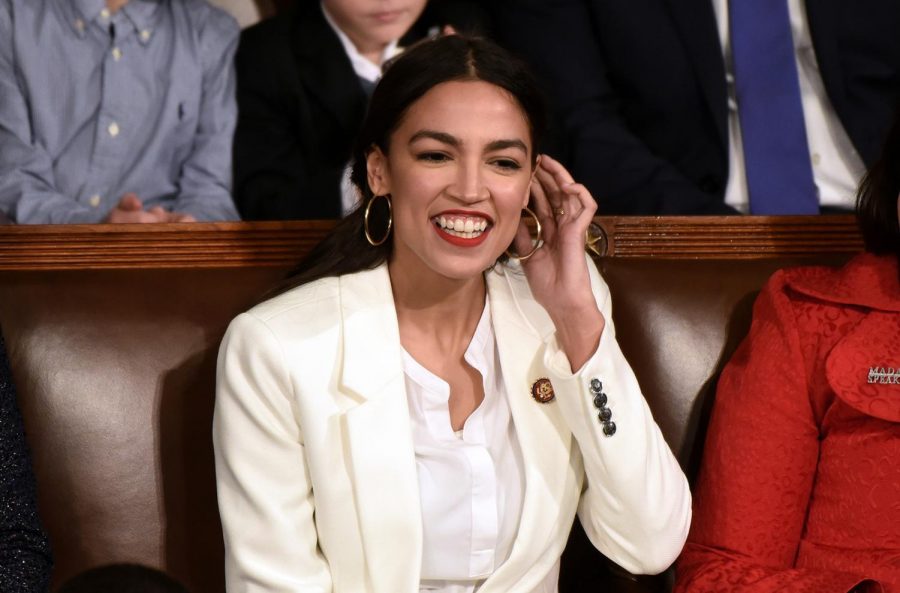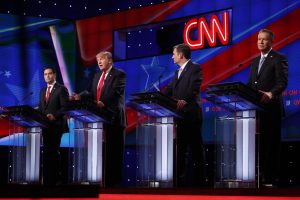Banerjee: The new millennial face of fireside chats
Social media and politics have become major tools of millennial politicians, but their increased use has raised questions of how genuine these tweets and Instagram stories actually are.
Rep. Alexandria Ocasio-Cortez (D-N.Y.) awaits the start of the 116th Congress on the floor of the U.S. House of Representatives at the U.S. Capitol on Thursday, Jan. 3, 2019, in Washington, D.C. (Oliver Douliery/Abaca Press/TNS)
January 17, 2019
In the 1930s, President Franklin D. Roosevelt revolutionized how political figures communicated with the everyday person with his radio-broadcast fireside chats.
Amid anxiety and distrust, hearing the president’s voice provided a much needed sense of ease. And now, nearly 90 years later, it seems as though we have again reached the point of similarly intense uncertainty and distrust, forcing politicians to return to the concept, albeit with a social-media-era revamp.
As the congressional freshmen elected in 2018 come into power, the tides of political communication have seemingly changed. These new politicians are now wielding Twitter, Instagram, and Facebook to bring social media users — many of whom are millennials — into the political milieu in a new way.
While social media have been a major tool of communication for years, they have been very underused by the politician themselves. The 2018 election functioned differently, with major social-media campaigns from politicians such as Alexandria Ocasio-Cortez. Beginning with her Twitter campaign and eventually encompassing her Instagram live “Cook + Q&A” series, a new face of politics has arisen.
Since then, others such as Ilhan Omar have jumped on the same train, trying to revitalize a sense of community among their constituencies. Beto O’Rourke, despite not winning his Texas election, still continues to update his followers with fragments of his day — famously including a trip to the dentist — in order to bridge the gap between politicians and nonpoliticians.
The rhetoric behind these short videos is clear: Politicians are just like us, and politics are not as scary or foreign as they seem. Ocasio-Cortez’s work to demystify the political process feels like, to some of us, deeply relevant content: We want to feel like we have some idea of what these names on the ballots are actually doing.
But does this work for everyone? Does this even work for Ocasio-Cortez? It’s debatable. On one hand, I’m likely to watch and interact with this intimate form of politics — I feel like I have more connection with the people supposedly representing me and people like me. The immediacy of an Instagram video — especially a livestream — feels unfiltered in a way that even a tweet cannot mimic.
But I don’t feel the same way watching Elizabeth Warren drink a beer on Instagram live. I feel addressed rather than spoken to — instead of intimacy, it brings back vivid memories of 2016 Hillary Clinton Snapchats. I can almost hear the 23-year-old unpaid intern behind the camera. At some point, Ocasio-Cortez’s millennial charm devolves into “chillin’ in Cedar Rapids.”
Reading headlines about Ocasio-Cortez teaching her party to use Twitter best makes me uncomfortable as well. What worked for Ocasio-Cortez, Omar, and even O’Rourke during his election was the feeling of a genuine knowledge of their appropriate audience. I didn’t feel like any of the younger politicians took a “Twitter 101” course but rather spoke from the heart and used that passion to appeal to me. This doesn’t work for politicians like Warren, who are clearly out of their depth.
As this appeal becomes a definite trend in politics, it puts me off for the exact same reason that Wendy’s Twitter feuds with other fast-food joints does: There’s nothing genuine about it — and that brings me back to the same, old discomfort that these social-media campaigns intended to fix in the first place.
There’s nothing inherently wrong with using social media to appeal to younger voters, but that appeal is, for me at least, inherently tied to a sense of off-the-cuff passion and genuine connection. Trying to curate a constant and consistent Twitter feed feels like any other political campaign to me. If you’re going to use social media to appeal to younger voters, demonstrate a genuine ease of discussion or stick to your conventional strengths.






